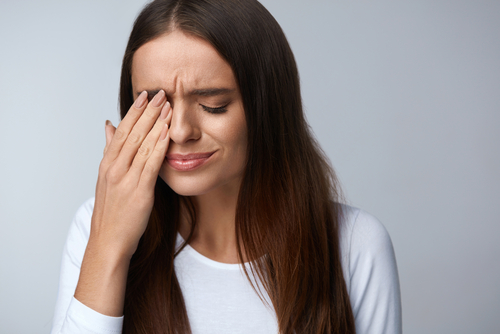Home » Blog » 4 Tips For Winter Eye Care Safety
4 Tips For Winter Eye Care Safety
Posted by: Georgia Eye Associates in Uncategorized

Sure, it’s the South, but winter is still here. Winter months mean colder weather, and that can wreak havoc on your eyes.
Did you know that the sun can be even more harmful in the winter months than in the summer?
Snow and ice give a perfectly reflective surface for harmful UV rays. This is called snow blindness, and it can be harmful to your eyes.
These reflective surfaces are only around when the temperature is low. You must protect your eyes from UV rays in the winter months.
The winter months can also worsen symptoms of dry eye syndrome and meibomian gland dysfunction. If you suffer from one of these eye diseases, you may experience greater discomfort when it’s cold.
Keep reading for 4 tips on how to make sure your eyes are protected this winter!
1. Wear Polarized Sunglasses
Your eyes are at a greater risk of harmful UV light exposure during the winter months. You need to make sure that your eyes are shielded from these harmful rays.
Polarized sunglasses can do just that. When you are shopping for some new shades, make sure that you buy sunglasses that protect your eyes from both UVA and UVB light.
Sunglasses that protect your eyes from both types of UV rays are often marked as “100% UV blocking.” This will ensure that your eyes are fully protected from the sun.
Don’t only wear your sunglasses when it is sunny outside. Snow and ice on the ground and in the trees can reflect bright light on overcast days as well.
Make sure that you wear polarized sunglasses whenever you are outside during the day.
2. Don’t Ski or Ride Without Goggles
Make sure to bring your ski goggles when you hit the slopes this year. Those who enjoy winter mountain sports like skiing, snowboarding, and tubing are at a greater risk of UV exposure.
This is because the air is thinning at high altitudes. This means there is less filtering between the sun and your eyes.
Polarized ski goggles are an excellent investment. These days, there are plenty of 100% UV blocking and tinted ski goggles to choose from.
Polarized ski goggles can protect your eyes from harmful UV rays when you are on the slopes. Sure, there may not be a lot of snow in Georgia, but if you like to hit the slopes on vacation, it’s important to know how to keep your eyes safe!
2. Add a Humidifier to Your Environment
If you suffer from dry eye disease or meibomian gland dysfunction, your symptoms can worsen in the winter months. This is because the air is dryer when it is colder.
While you can’t control the outdoor environment, you can control your indoor environment. Try adding a humidifier to your home or office.
This can help add moisture to the air, making it less dry and more accommodating to your eyes.
3. Wear Glasses Not Contacts
The dry and cold winter air can make your dry eye symptoms flare-up. Wearing glasses instead of contact lenses can shield your eyes from wind, and some of the dry air. Your dry eyes will thank you!
4. Turn Down the Heat
Turning down the heat in your home or office can also help with your dry eye symptoms. Indoor heat from a furnace or heat pump is dry.
This can make your indoor environment drier, which can worsen your dry eye symptoms.
Ready to take on the winter months? An eye exam is an excellent way to start. Schedule yours today with Georgia Eye Associates in Atlanta, GA!
Tags: atlanta winter eye care, winter eye atlanta, winter eye care